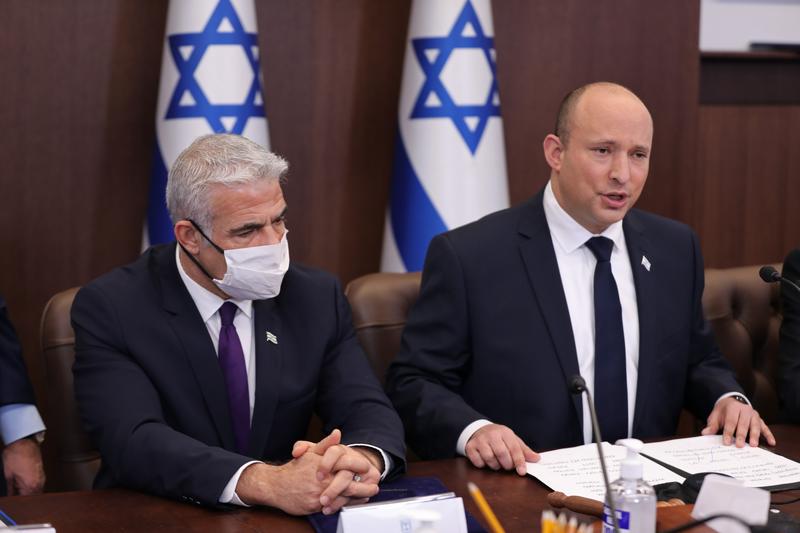 Israeli Prime Minister Naftali Bennett, right, and Foreign Minister Yair Lapid attend a cabinet meeting at the Prime Minister's Office in Jerusalem, Nov 21, 2021. (ABIR SULTAN/POOL VIA AP)
Israeli Prime Minister Naftali Bennett, right, and Foreign Minister Yair Lapid attend a cabinet meeting at the Prime Minister's Office in Jerusalem, Nov 21, 2021. (ABIR SULTAN/POOL VIA AP)
JERUSALEM – Israel's Prime Minister Naftali Bennett signaled readiness on Tuesday to step up Israel's confrontation with Iran and reiterated that his country would not be bound by any new Iranian nuclear deal with world powers.
Indirect negotiations will begin on Nov 29 about reviving the 2015 deal, which former US President Donald Trump withdrew from, deeming it insufficient to shut down projects with bomb-making potential – a view shared by the Israelis.
READ MORE: Israel's defense minister says prepared to attack Iran
Iran, which denies seeking nuclear arms, has since the US walkout breached the deal with expanded uranium enrichment.
We face complicated times. It is possible that there will be disputes with the best of our friends.
Naftali Bennett, Prime Minister, Israel
Bennett, who took power in June, described Iran in a speech as being at "the most advanced stage of its nuclear program".
While his government has previously said it would be open to a new nuclear deal with tougher restrictions on Iran, Bennett reasserted Israel's autonomy to take action against its arch-foe.
"We face complicated times. It is possible that there will be disputes with the best of our friends," he told a televised conference hosted by Reichman University.
"In any event, even if there is a return to a deal, Israel is of course not a party to the deal and Israel is not obligated by the deal."
Bennett voiced frustration with what he described as Israel's smaller-scale clashes with Iranian guerrilla allies.
ALSO READ: Biden, Israeli PM discuss Iranian nuclear issue, security ties
"The Iranians have encircled the State of Israel with missiles while they sit safely in Tehran," he said. "To chase the terrorist du jour sent by the (Iranian covert) Qods Force does not pay off anymore. We must go for the dispatcher."
Stopping short of explicitly threatening war, Bennett said cyber-technologies and what he deemed Israel's advantages as a democracy and international support could be brought to bear.
"Iran is much more vulnerable than is commonly thought," he said.


